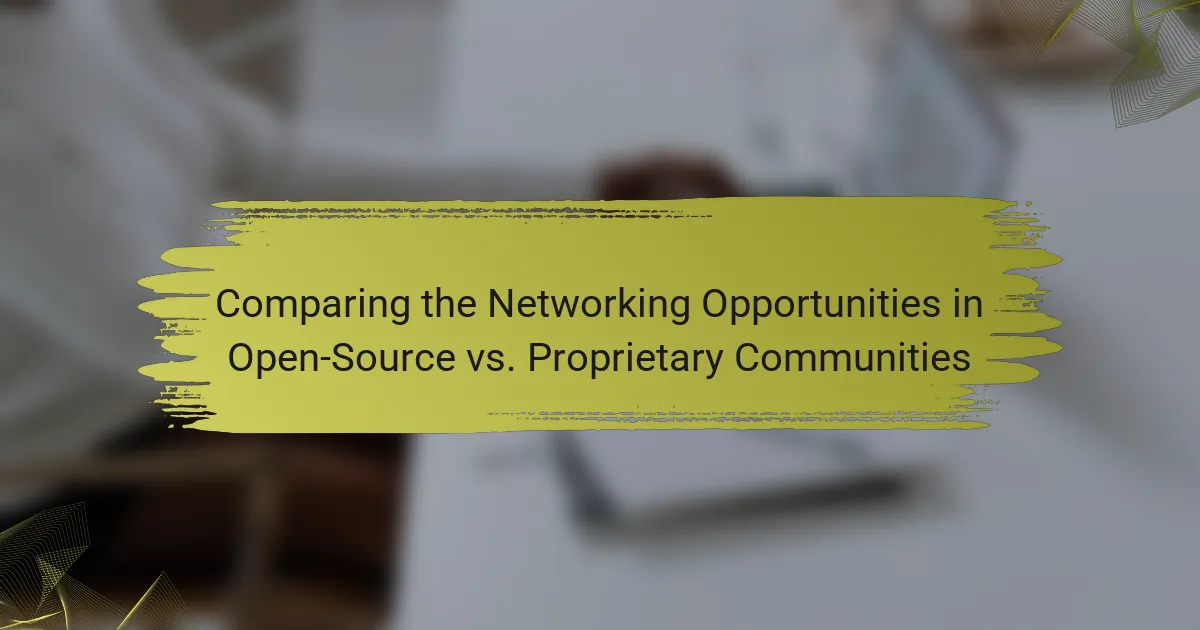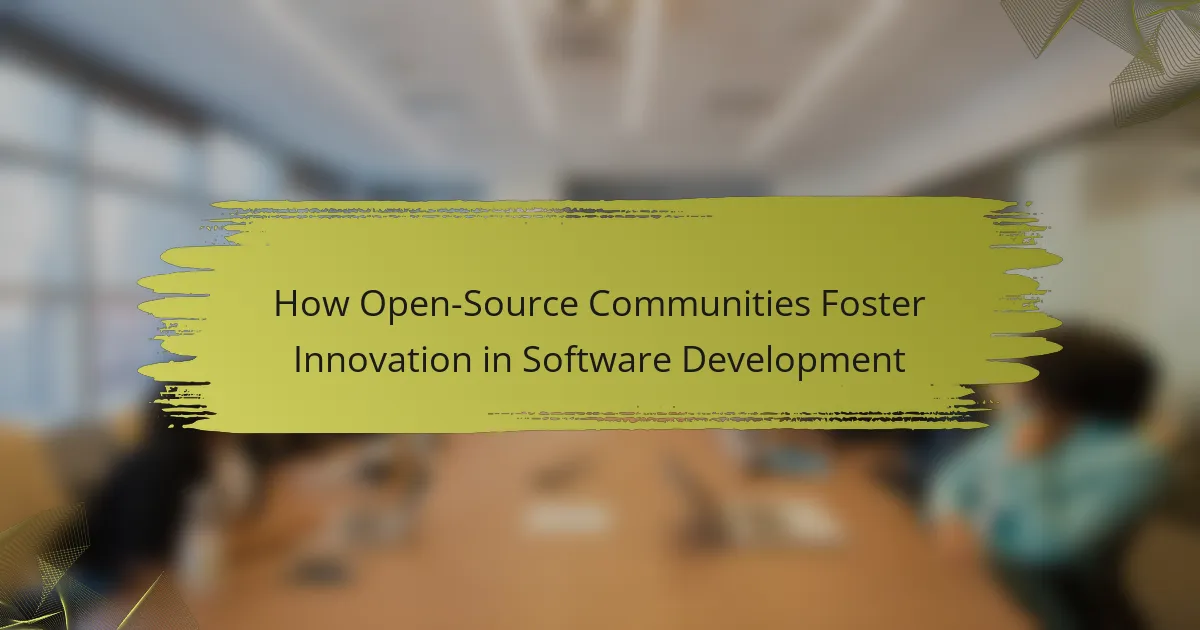Open-source communities are vital for the skill development of junior developers, offering practical projects, mentorship, and collaborative learning opportunities. By participating in these environments, junior developers can enhance their technical expertise and confidence through hands-on experience and peer interactions.

How do open-source communities support skill development for junior developers?
Open-source communities play a crucial role in the skill development of junior developers by providing access to practical projects, mentorship, and collaborative learning experiences. These environments foster growth through hands-on involvement and peer interactions, which are essential for building technical expertise and confidence.
Access to real-world projects
Junior developers gain invaluable experience by contributing to real-world projects within open-source communities. These projects often involve current technologies and practices, allowing newcomers to apply theoretical knowledge in practical settings.
Engaging with real projects helps junior developers understand the software development lifecycle, from planning to deployment. They can start with smaller tasks, such as fixing bugs or adding features, gradually taking on more complex responsibilities as their skills improve.
Mentorship opportunities
Open-source communities frequently offer mentorship programs where experienced developers guide juniors through their learning journey. This relationship is beneficial, as mentors can provide personalized feedback, share industry insights, and help navigate challenges.
Mentorship can take various forms, including code reviews, pair programming, and regular check-ins. Juniors should actively seek out mentors and be open to constructive criticism, as this is a vital part of their development process.
Collaborative learning environments
Collaboration is a cornerstone of open-source communities, encouraging junior developers to learn from one another. By working together on projects, they can share knowledge, troubleshoot issues, and celebrate successes as a team.
Participating in discussions, forums, and community events further enhances learning. Juniors should engage actively, ask questions, and contribute their insights, as this interaction fosters a deeper understanding of concepts and builds a supportive network.

What are the benefits of participating in open-source communities?
Participating in open-source communities offers junior developers numerous advantages, including skill enhancement, professional networking, and opportunities for portfolio development. Engaging in these collaborative environments allows developers to learn from real-world projects and connect with experienced professionals.
Enhanced coding skills
Open-source communities provide a platform for junior developers to improve their coding skills through hands-on experience. By contributing to real projects, developers can learn best practices, coding standards, and new technologies. This practical exposure often leads to a deeper understanding of programming concepts and problem-solving techniques.
To maximize skill enhancement, junior developers should choose projects that align with their interests and skill levels. Actively participating in code reviews and seeking feedback can further accelerate learning. Additionally, tackling issues labeled as “beginner-friendly” can help build confidence and competence.
Networking with industry professionals
Engaging in open-source communities allows junior developers to network with industry professionals, which can lead to mentorship and job opportunities. Collaborating on projects fosters relationships that might not be possible in traditional learning environments. Developers can connect with contributors who have diverse expertise and backgrounds.
To effectively network, developers should actively participate in discussions, attend community events, and contribute to project documentation. Building a strong online presence through platforms like GitHub can also showcase skills and attract potential employers.
Portfolio building
Contributing to open-source projects is an excellent way for junior developers to build a robust portfolio. A well-documented portfolio that includes contributions to various projects demonstrates practical experience and technical skills to potential employers. It showcases the developer’s ability to work collaboratively and solve real-world problems.
When building a portfolio, developers should highlight significant contributions, such as features implemented, bugs fixed, or documentation improved. Including links to repositories and detailed descriptions of their roles can provide context and depth. Regularly updating the portfolio with new projects ensures it remains relevant and reflects ongoing growth.

Which open-source platforms are best for junior developers?
Junior developers can greatly benefit from engaging with open-source platforms that provide collaborative environments and a wealth of resources. The best platforms for skill development include GitHub, GitLab, and SourceForge, each offering unique features and community support.
GitHub
GitHub is the most popular open-source platform, known for its vast repository of projects and a strong community. It allows junior developers to contribute to existing projects, learn from others’ code, and showcase their work through portfolios.
To get started, create a GitHub account, explore trending repositories, and look for issues labeled as “good first issue” to find beginner-friendly tasks. Engaging with pull requests and participating in discussions can also enhance learning.
GitLab
GitLab offers a comprehensive suite of tools for software development, including built-in CI/CD pipelines. This platform is particularly beneficial for junior developers looking to understand the entire development lifecycle from coding to deployment.
Junior developers can create their own projects or contribute to others, taking advantage of GitLab’s extensive documentation and tutorials. It’s advisable to familiarize oneself with GitLab’s unique features, such as issue tracking and merge requests, to maximize the learning experience.
SourceForge
SourceForge is one of the oldest open-source platforms, hosting a variety of projects, especially in the realm of software development. It provides a straightforward interface for browsing projects and accessing documentation, making it accessible for junior developers.
While SourceForge may not have the same level of community engagement as GitHub or GitLab, it still offers valuable opportunities for contribution. Junior developers should explore the available projects and consider joining those that align with their interests, as this can lead to skill enhancement and networking opportunities.

What skills can junior developers gain from open-source contributions?
Junior developers can gain a variety of essential skills through open-source contributions, including technical expertise, collaboration techniques, and real-world problem-solving. Engaging with open-source projects allows them to apply their knowledge in practical settings while learning from experienced developers.
Version control proficiency
Version control is a fundamental skill for developers, and contributing to open-source projects typically involves using systems like Git. By managing code changes and collaborating with others, junior developers learn how to track modifications, resolve conflicts, and maintain project history effectively.
To build proficiency, junior developers should familiarize themselves with common commands and workflows, such as branching, merging, and pull requests. Practicing these skills in a collaborative environment helps solidify their understanding and prepares them for future professional roles.
Problem-solving abilities
Open-source contributions often present unique challenges that require creative problem-solving. Junior developers encounter real-world issues that demand critical thinking and innovative solutions, enhancing their ability to analyze problems and implement effective fixes.
To improve problem-solving skills, junior developers should actively seek out issues labeled as “good first issue” or “help wanted” in repositories. Tackling these tasks not only boosts confidence but also provides valuable experience in debugging and optimizing code.
Communication skills
Effective communication is crucial in open-source environments, where developers collaborate across diverse teams. Junior developers learn to articulate their ideas clearly, provide constructive feedback, and document their work, which is essential for successful teamwork.
To enhance communication skills, junior developers should engage in discussions on platforms like GitHub or mailing lists, participate in code reviews, and write clear commit messages. Regular interaction with other contributors fosters a collaborative spirit and improves their ability to convey technical concepts to various audiences.

How can junior developers find open-source projects to contribute to?
Junior developers can find open-source projects to contribute to by exploring platforms like GitHub, engaging in developer forums, and participating in hackathons. These avenues provide access to a wide range of projects and communities that welcome contributions from newcomers.
Exploring GitHub repositories
GitHub is a primary platform for open-source projects, hosting millions of repositories across various programming languages. Junior developers can use the search function to filter projects by language, popularity, or recent activity, making it easier to find suitable contributions.
Look for repositories labeled with “good first issue” or “beginner-friendly” tags, as these often indicate tasks that are manageable for those new to the project. Engaging with the community through issues and pull requests can also enhance learning and networking opportunities.
Joining developer forums
Developer forums, such as Stack Overflow, Reddit, and specialized communities like Dev.to, are excellent resources for discovering open-source projects. These platforms often feature discussions about ongoing projects and can connect junior developers with experienced mentors.
Participating in these forums allows developers to ask questions, share experiences, and receive guidance on which projects might align with their skills and interests. Regularly checking for project recommendations or collaboration opportunities can lead to valuable contributions.
Participating in hackathons
Hackathons are events where developers collaborate intensively on projects over a short period, often focusing on open-source initiatives. Junior developers can join these events to gain hands-on experience, learn from peers, and contribute to real-world applications.
Many hackathons provide resources and support for beginners, making them a low-pressure environment to experiment and innovate. Look for local or virtual hackathons that emphasize open-source contributions, as these can be particularly beneficial for skill development and networking.



